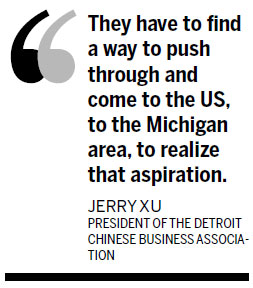Detroit: Gold mine for China
Updated: 2013-07-30 08:11
By Michael Barris (China Daily)
|
||||||||
Chassis class

"In China, at original equipment manufacturers, the senior people - even managers and directors in engineering - have fewer than 10 years, 15 years of experience," Su said. "And most of that experience is in reverse-engineering, or copying. They don't have vehicle-development experience." Su chuckled as he said the youngest engineer at the US R&D center, which focuses on chassis design, has 19 years of Detroit industry experience, which is more than some senior managers in China. By contrast, his most senior employee, retired, had 35 years of experience.
China has reverse-engineered many cars, but even creating a copy requires vehicle-development know-how, Su said. "Vehicles have copyright issues; sometimes you are forced to modify. If you don't know the principles of how to modify, you can't do it."
Most important, you need vehicle-development expertise to make automobiles to the performance and quality specifications demanded by today's buyers, he said.
"You can never copy the technical know-how," he said, as he showed a prototype of a large sedan that Changan, traditionally a maker of smaller cars, plans to build and sell in China. When finished, the car will target prosperous buyers with families who also crave a big, luxurious vehicle.
Frank Yang, managing director at ZYNP International in Romulus, said the combination of the Detroit area's existing transportation and manufacturing infrastructure, talent pool and cost-efficiency, along with government tax breaks, allow that US unit to pursue its plan to be a one-stop, full-service company in the engine cylinder industry. ZYNP International's ability to offer customers R&D, engineering, supply chain management, manufacturing and financing under one roof "differentiates us from competitors, either locally or internationally", Yang said.
A wide range
"All this is hard to find in other areas of the country," he said. "Detroit is the hub."
Showing that being Chinese doesn't guarantee a job here, ZYND's Romulus-based engineering staff hail from a range of countries, including China, the US, Brazil, Mexico and Canada. The company employs 50 to 80 people, including seasonal workers. Most are Americans or US residents. The staff include one or two Chinese nationals and very few Chinese Americans because the company emphasizes US industry experience.
"We only have visitors from our China operation to do troubleshooting, to undertake training, to give training, and to receive whatever knowledge they can take from the US," Yang explained.
He said the company used its flexible pay system and entrepreneurship programs to lure valuable laid-off engineers "to grow together with us".
At ZYNP, workers repackage engine cylinder liners in returnable containers, or "dunnage", made in China for direct shipment to customers that include GM, Ford, Chrysler, Volvo, Nemak and Cummins.
ZYNP's history dates back more than 50 years in Mengzhou, China, where it has its manufacturing operations. The company, which employs 3,500 people in China and North America, started ZYNP North America in two Romulus locations in 2005.
Program development manager Leslie Santos said Detroit's bankruptcy "does not impact ZYNP's business or plans. Although ZYNP is in the metropolitan Detroit area, that does not mean we are located in the city. We are not connected to Detroit as far as our administration or anything like that. We just say we're in Detroit because Detroit is so well known as the automotive capital of the world," she said.
Despite Motown's well-publicized woes, the Chinese automotive companies' arrival has triggered an influx of companies from other fields. The new arrivals are "looking for clean technologies, environmental and water solutions" as directed by China's latest Five-Year Plan, according to Milan Stevanovich, business community development officer with the Detroit Chinese Business Association.
"We've had such an overabundance of automotive engineers here over the last five years. A lot of these engineers here are now either working with angel capitalists or are just starting new startups in all these new emerging sectors," Stevanovich said. "It's quite an exciting time to be here in Michigan."
Some observers see China eventually joining Japan, Germany, South Korea and other foreign countries in making and selling vehicles in the US. A March report by the US Congressional Research Service said the Chinese government ultimately is "seeking to develop vehicles that will be built in China and exported more widely to other markets, as the Japanese and Koreans did earlier".
China already is a major importer of US auto parts. Last year it imported about $1.6 billion parts, according to United States International Trade Commission statistics. The Congressional Research Service report says recent acquisitions of US parts companies will help Chinese parts makers "target technology and product innovations to enhance their operations" back home while "also permitting a shift from supplying low-margin parts to more profitable activities, such as integrating parts into component systems".
Joint venture
China's recent acquisitions include Chinese auto-parts conglomerate Wanxiang Group's $250 million acquisition early this year of US battery maker A123 Systems Inc; the purchase by Pacific Century Motors, a joint venture between the Beijing municipal government and another Chinese partner, of Nexteer Automotive from GM in 2010 for $450 million, the largest Chinese acquisition of a US auto parts company; and the purchase by Beijing West Industries, a joint venture of two Chinese State-owned enterprises, of the suspension and brake units of Delphi Corp in 2009 for $100 million.
Making and selling vehicles in the US would cap off the Chinese auto industry's 30-year effort to develop globally, which reached a milestone in 2009 when it overtook the US to become the world's largest producer of and market for motor vehicles.
Jerry Xu says the days of China making and selling cars in the US could happen.
"China is not the first group to come here to do business," Xu said. "There's Korean, Japanese, there's German.
"As long as you have good quality and service, the American market is open for you."
But the Chinese firms "have to better themselves. They have to make sure they provide value to get business market share here," he said. "They have to continue to prove themselves, make sure they have a long-term plan to grow here. To be successful, they have to make themselves a citizen of their community."
Changan's Su says the US may have to wait five to 10 years to see the first Chinese car sold here, given the engineering techniques typically demanded by developed nations, including pollution-control and safety features. He cites the slow rise of Japan's Toyota Motor Corp as an example of how emerging nations can eventually break through in the fiercely competitive global market.
"Twenty-five years ago, the Japanese came here and tried to study the US market," Su said. Now Toyota can match strides with GM and Ford in the world market. But even Toyota is a relative newcomer to the US marketplace compared with one particular Detroit icon that still continues to have its world headquarters in the Motor City.
"General Motors," he said, "is more than 100 years old."
Contact the writer at michaelbarris@chinadailyusa.com
Most Viewed
Editor's Picks

|

|

|

|

|

|
Today's Top News
Spain investigators: Train driver was on phone
Apple faces more staff abuse charges
Spending surge for renewables
Beijing and Canberra to resume trade talks
Top leader vows to meet growth target
2,290 disciplined for extravagance
Japan diplomat seeks to mend ties
Draft rule requires a license for dog breeding
US Weekly

|

|















